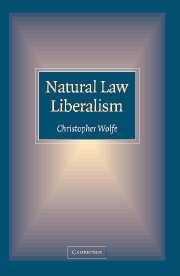Book contents
- Frontmatter
- Contents
- Acknowledgments
- Introduction
- PART I CONTEMPORARY LIBERALISM
- 1 Contemporary Liberal Exclusionism I: John Rawls's Antiperfectionist Liberalism
- 2 Contemporary Liberal Exclusionism II: Rawls, Macedo, and “Neutral” Liberal Public Reason
- 3 Contemporary Liberal Exclusionism III: Gutmann and Thompson on “Reciprocity”
- 4 Contemporary Liberalism and Autonomy I: Ronald Dworkin on Paternalism
- 5 Contemporary Liberalism and Autonomy II: Joseph Raz on Trust and Citizenship
- 6 “Offensive Liberalism”: Macedo and “Liberal” Education
- PART II LIBERALISM AND NATURAL LAW
- Index
6 - “Offensive Liberalism”: Macedo and “Liberal” Education
Published online by Cambridge University Press: 24 July 2009
- Frontmatter
- Contents
- Acknowledgments
- Introduction
- PART I CONTEMPORARY LIBERALISM
- 1 Contemporary Liberal Exclusionism I: John Rawls's Antiperfectionist Liberalism
- 2 Contemporary Liberal Exclusionism II: Rawls, Macedo, and “Neutral” Liberal Public Reason
- 3 Contemporary Liberal Exclusionism III: Gutmann and Thompson on “Reciprocity”
- 4 Contemporary Liberalism and Autonomy I: Ronald Dworkin on Paternalism
- 5 Contemporary Liberalism and Autonomy II: Joseph Raz on Trust and Citizenship
- 6 “Offensive Liberalism”: Macedo and “Liberal” Education
- PART II LIBERALISM AND NATURAL LAW
- Index
Summary
Diversity and Distrust is part of Stephen Macedo's ongoing project of describing and defending a robust “transformative” liberalism. One of its chief purposes is to demonstrate the harmony between John Rawls's political liberalism (free of commitment to any “comprehensive” philosophical or theological views) and a liberalism with a strong commitment to shape its citizens' moral character, that is, to shape them into (political) liberals. In other words, liberalism can be both “neutral,” with respect to substantive comprehensive philosophical and theological views, and also deeply committed to encouraging the formation of civic virtues essential to this “political liberalism.” Diversity and Distrust is the part of the project that defends public education as an essential element in that transformative undertaking and that makes an argument for limiting parental rights to control education, especially the rights of those parents who do not fully embrace liberalism, such as fundamentalists – all of this, without committing itself to any particular comprehensive views.
In this chapter, I argue that Macedo's book fails to accomplish its objective. It is true that it shows the harmony between Rawls's political liberalism and his own transformative liberalism, but it does so only by offering a fine example of how Rawlsian political liberalism is really a comprehensive liberalism. And in the final analysis, it shows how this “offensive liberalism” is a significant threat to freedom.
DIVERSITY AND DISTRUST
Diversity and Distrust, Macedo says in his preface, is about “liberalism's transformative ambitions.”
- Type
- Chapter
- Information
- Natural Law Liberalism , pp. 100 - 128Publisher: Cambridge University PressPrint publication year: 2006

